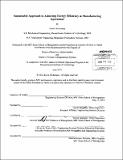Sustainable approach to achieving energy efficiency in manufacturing operations
Author(s)
McKenney, Kurtis G. (Kurtis Gifford), 1979-
DownloadFull printable version (12.65Mb)
Other Contributors
Leaders for Global Operations Program.
Advisor
Sarah Slaughter and Steven Eppinger.
Terms of use
Metadata
Show full item recordAbstract
Energy management in industrial facilities is becoming increasingly popular as firms attempt to become more environmentally responsible and reduce cost by improving operational efficiency. Raytheon is a leader in their industry in energy management, and they view the initiative as a way to become more competitive along with being environmentally responsible. The goal of this project was to develop a framework for achieving sustainable cost reduction in production operations through energy efficiency. The energy efficiency framework will build off the existing lean and six sigma tools and philosophies in an attempt to accelerate acceptance and deployment by using a common language and proven methods in the company and industry. A 1.6 million square foot manufacturing facility at Raytheon IDS consumed $13 million of energy (90% electric) in 2010, 75% of which was consumed directly by production equipment. The equipment is diffuse, highly specialized, and used in "high mix, low volume" manufacturing. The challenge with improving production energy efficiency in this environment is that it requires a combination of technology improvements, processes modifications, and changes in the way employees conduct their work every day. The project's success relied on cross-functional (i.e., operations, engineering, and facilities) engagement from senior management to front-line operators. To sustain results, energy performance metrics were designed to keep production area leaders engaged and allow management to set progressive goals over time and reward success. The proposed metrics use a combination of tracked energy use and a "best practice" scorecard that promotes proactive engagement. Lean "Energy Gemba Walks" were initiated to generate and manage best practices and to share knowledge among production areas. The implementation phase of the pilot project (October and November 2011) resulted in an 18% energy reduction compared with the average for the year. Meanwhile, production output and total labor hours were up 18% and 11%, respectively, during the pilot, while the product mix remained constant throughout the year. The improvements, if sustained, correspond to a $74,000 per year cost savings in the pilot area.
Description
Thesis (M.B.A.)--Massachusetts Institute of Technology, Sloan School of Management; and, (S.M.)--Massachusetts Institute of Technology, Engineering Systems Division; in conjunction with the Leaders for Global Operations Program at MIT, 2012. Cataloged from PDF version of thesis. Includes bibliographical references (p. 75-76).
Date issued
2012Department
Leaders for Global Operations Program at MIT; Massachusetts Institute of Technology. Engineering Systems Division; Sloan School of ManagementPublisher
Massachusetts Institute of Technology
Keywords
Sloan School of Management., Engineering Systems Division., Leaders for Global Operations Program.